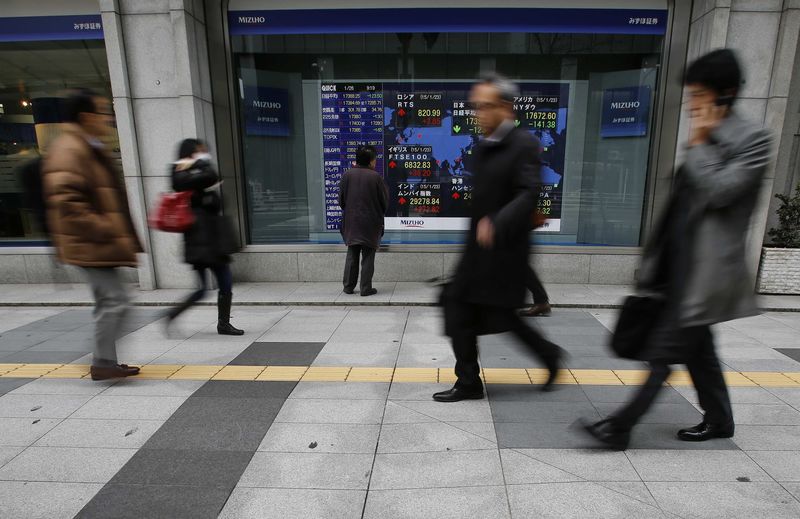Gold bars to be exempt from tariffs, White House clarifies
(Updates ahead of U.S. markets open)
* European shares buckle again after early charge
* Wall Street futures back to flat after earlier rise
* U.S. Treasury yields slide towards 1% for first time
* BOJ and BoE make soothing noises
* Oil higher on signals of supply cuts from OPEC
By Marc Jones
LONDON, March 2 (Reuters) - World stock markets regained a
measure of calm on Monday as hopes for a raft of global interest
rate cuts to soften the economic blow of the coronavirus
steadied nerves and drove U.S. Treasury yields close to 1%.
After last week's worst plunge for equities markets since
the depths of the 2008 financial crisis, it was always going to
be a wild ride.
Asia had initially dived again after China reported a record
slump in factory activity but the
region rallied to finish higher as bond yields sunk and talk of
OPEC supply cuts sent oil prices roaring up as much 3.5%. O/R
Europe then made a blistering start. The FTSEurofirst 300
.FTEU3 jumped over 2%, putting it on course for its best day
in well over a year, only to suffer a major mid-morning wobble
that left it just 0.2% better off. .EU
Wall Street S&P 500 and Dow futures ESc1 1YMc1 went on a
similarly erratic trip; first diving, then springing, then
stumbling and eventually stalling near-flat. .N
"The market is coming back because there is perception that
there will be a coordinated G7 policy response," said BlueBay
Asset Management's head of credit strategy David Riley.
"We have Fed and ECB meetings coming up in the next couple
of weeks. The Fed is the key one and it will be very hard for
them to hold off (from rate cuts) if we are in a situation where
the economic downsides are becoming more prevalent."
The sheer scale of losses last week -- almost $6 trillion
was wiped off world stocks -- have led financial markets to
price in policy responses from almost every major central bank.
L4N2AU0ZB
Futures now imply a full 50 basis point cut by the U.S.
Federal Reserve at its March 17-18 meeting 0#FF: , followed by
a 10 basis point snip from the ECB in April. Australian markets
0#YIB: are meanwhile pricing in a quarter-point cut at the
RBA's Tuesday meeting.
Bank of Japan Governor Haruhiko Kuroda fanned those
expectations, saying the BOJ would take steps to stabilise
markets if needed.
The Bank of England said it, too, was monitoring
developments and assessing the "potential impacts on the global
and UK economies and financial systems". Bets that the Fed will be first of the pack to move -- and
probably by the most, considering it has more room to cut
--pushed the dollar to a one-month low against the world's major
currencies as bond yields slid south. /FRX
Individually, it was down at $1.1070 to the euro EUR= ,
flat on the yen at 108.08 yen JPY= and only made gains on the
pound GBP= , which wilted as what are likely to be fraught
post-Brexit trade talks with the EU began in Brussels.
JUST ANOTHER MANIC MONDAY
MSCI's broadest index of world shares .MIWD00000PUS rose
for the first time in eight sessions after recovering from
Asia's early dip, though the 0.3% uptick barely offset its 10.4%
tumble last week.
The disruption to global supply chains, productivity and
global travel caused by the coronavirus has darkened the outlook
for a world economy already struggling with the fallout of the
U.S.-China trade war.
In Paris, the Organisation for Economic Cooperation and
Development (OECD) warned the outbreak was shaping up to cause
the worst global downturn since the 2008-09 financial crisis. In
a bleak scenario, growth could drop to just 1.5%. "The main message from this downside scenario is that it
would put many countries into a recession, which is why we are
urging measures to be taken in the affected areas as quickly as
possible," OECD chief economist Laurence Boone told Reuters.
The bond markets were giving their view loud and clear.
The benchmark U.S. 10-year Treasury bond hit a fresh record
low yield of 1.0300% US10YT=RR overnight and was last at
1.065%. In Europe, German Bunds were the lowest in six months at
-0.64%. GVD/EUR
Analysts said a sustained market recovery depended on the
rate of new coronavirus infections slowing outside China.
The epidemic, which began in the Chinese province of Hubei,
has killed 3,000 people worldwide as authorities race to contain
infections in Japan, Iran, Italy, South Korea and the United
States.
Commodity markets were part of Monday's global
stabilisation. Oil prices bounced as much as $1.5 a barrel off
multi-year lows, helped by hopes of a deeper cut in output by
OPEC. O/R
Brent crude last traded at $50.5 per barrel LCOc1 and U.S.
crude CLc1 at $45.2 per barrel, while industrial metals copper
and nickel were 1.5% and 2.5% higher respectively and gold
jumped 1.4% after a dip last week. MET/L GOL/
World markets performance https://tmsnrt.rs/37RShMa
^^^^^^^^^^^^^^^^^^^^^^^^^^^^^^^^^^^^^^^^^^^^^^^^^^^^^^^^^^^>
